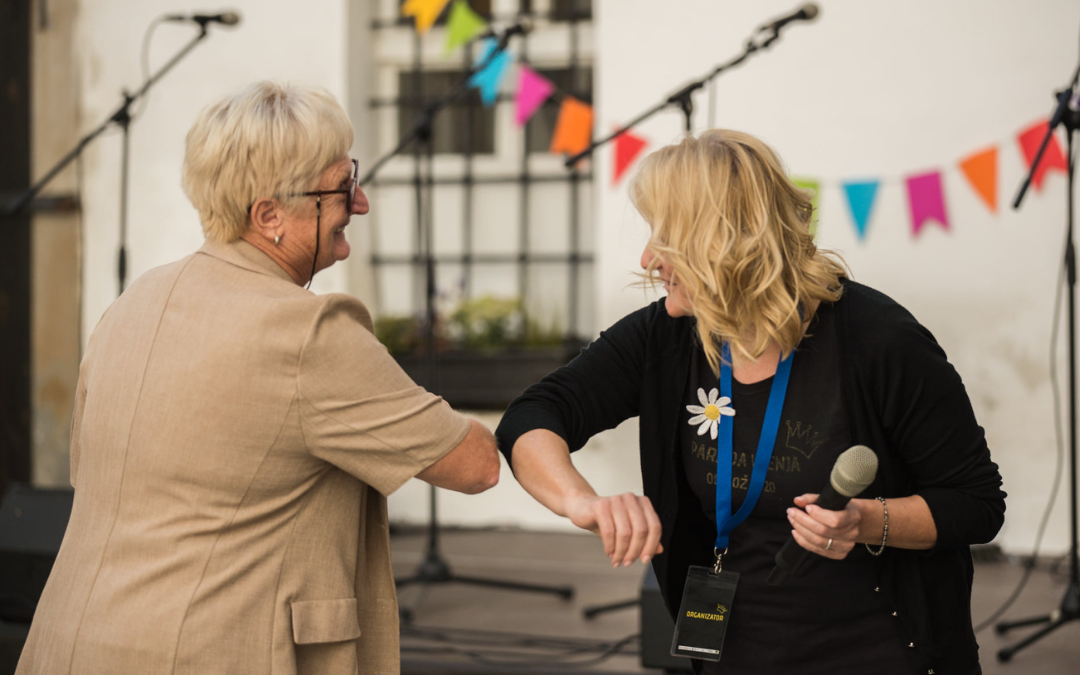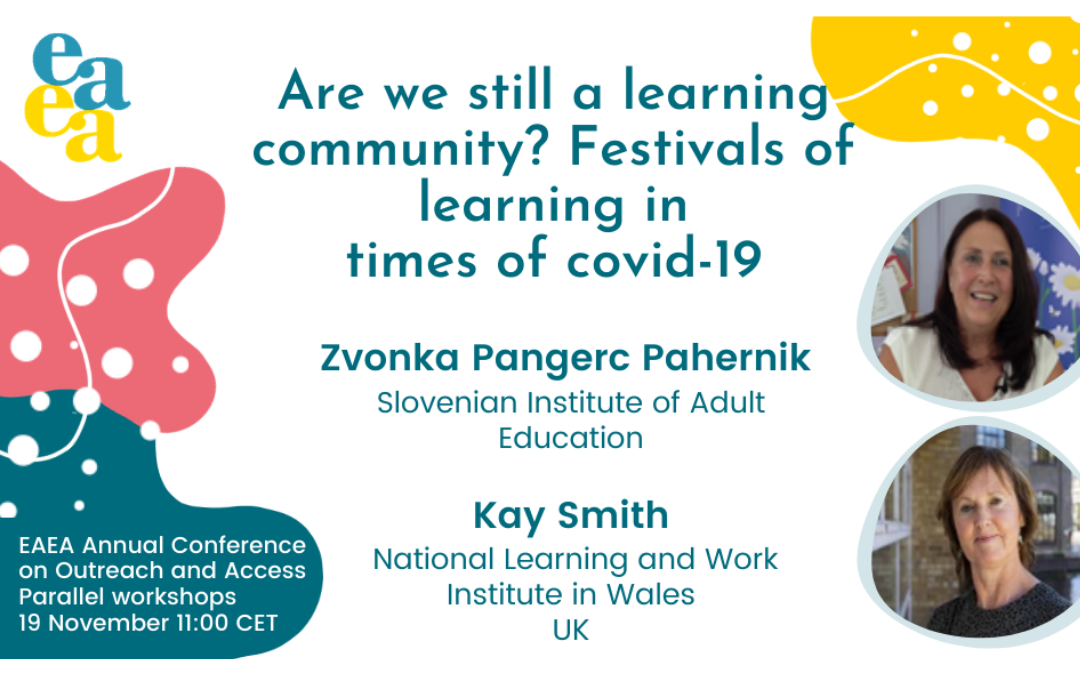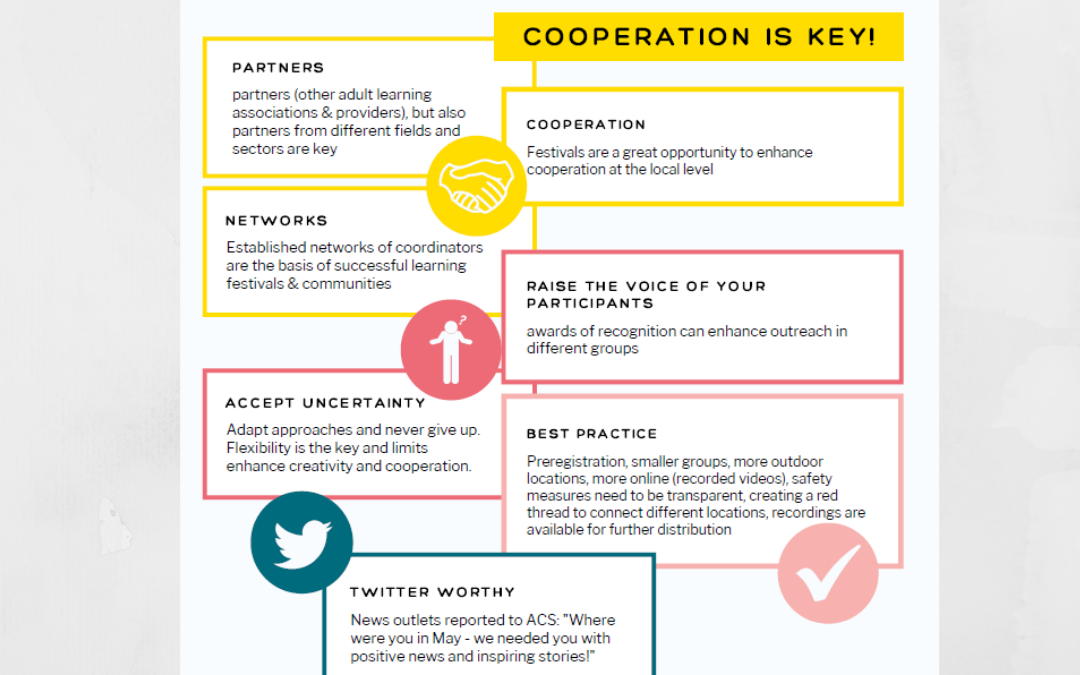EAEA dedicated its annual conference to this topic
As early as March of this year, the EAEA asked its members for information about the consequences the challenging health situation is having on adult education. We participated in their survey and later wrote an article about it. The key message was that we are doing our best to adapt to the new circumstances and that we are not giving up. The activities of the adult education community during the first wave of COVID-19 were studied in much more detail by Dr Tanja Možina and her colleagues, who presented the evaluation at the recent AAEC 2020. Her contribution also included findings as well as recommendations for the second wave, which has really been making our lives miserable since the second half of October.
Before that, however, there was a period when we could, to a limited extent, still socialise, learn, create and even celebrate. We used that time to carry out the jubilee 25th LLW 2020. The EAEA wanted to know how we were able to do that and asked us to share our experience with the participants at the EAEA Virtual Annual Conference. Entitled “Outreach and Access in Adult Learning”, the conference was held on 19 and 20 November on Zoom and attracted some 130 participants.
Are we still a (learning) community?
This question was the common thread of the workshop where Kay Smith from Learning & Work Wales and I, the author of this article, each presented our festivals of learning. It has to be noted though that I did it on behalf of the co-creators of this year’s LLW. In this, I was relying on the answers given by 19 (out of 36) LLW coordinators in the survey on the implementation of the festival under the influence of COVID-19.
Presenting the national opening was a simple matter, as all the contributions were pre-recorded and played automatically with minimal introductory and concluding text.
Expert meetings over Zoom are now completely ordinary, but on 15 September the Adult Education Colloquium, or rather the learning meeting among representatives of nearly every European country, was quite a challenge for us. According to the participants, we passed it with flying colours – and we felt the same way! More in the article.
What we were most often asked about was how we managed to prepare and carry out local events live or in combination with virtual ones. Moving the LLW from May to September allowed us to make preparations when the protocols were more clearly defined. Despite this, however, we faced uncertainty. But we took it in stride, adapted, gathered our strength and concluded that the new coronavirus will not stop us. We found creative freedom within the confines of the restrictions, which were becoming more and more stifling over the course of five weeks. We asked visitors to register in advance. We formed smaller groups and held the events in multiple successions. Luckily these weeks were sunny, and many of the events could be held outside, at several venues and sometimes even without participants – just to record them. Safety regulations were followed at all times (masks, distance, sanitiser, permitted number of visitors – 50 at the time, etc.). Even more attention was paid to motivating the partners than in the previous years. Some were discouraged by the situation and withdrew from participating. On the other hand, new, flexible and dedicated event providers joined. At the local level, the LLW networks might have gotten a little smaller, but fighting against COVID-19 together has made them stronger.
A success story with many faces
Interaction gave way to individual actions connected by a common thread, e.g. the common slogan “I learn, therefore I am”. Content-wise, the events dealt with digital skills, a healthy lifestyle, personal development, sustainability in regard to natural and cultural heritage, reading, relationships, travel, cooking, sports and much more. Quite what you would expect, right? There were more digital or rather virtual approaches – both in the preparatory and the implementation phase. We recorded and published the events in various media (websites, YouTube, FB, etc.), whereby we are really excited that they are permanent and that they can be replayed any time later. At the virtual events (lectures, workshops, even exhibitions and a fashion show, etc.) this time, we did not ask the visitors to leave their comfort zones but rather recommended that they stay in them and join the events in a calm and collected manner at their leisure. This was another reason why we reached more people than in previous years. Media support was excellent, and they told us directly that they are looking for positive and encouraging stories.
LLW 2020 performance indicators are at nearly half compared to those from the previous year. We, however, are absolutely thrilled by the outcome, because we know that it was obtained through persistence, flexibility, innovation … – with approaches and virtues that we are going to keep. At the venues, we never forgot to mention how much personal contact means to us and how nothing can be taken for granted any more. Although, if we are being completely honest, we must admit that COVID-19 has awakened in us creative powers that we never knew we had.
This is the story of this year’s LLW, told using the first-person plural narrative, even though most of the credit for its success goes to the LLW coordinators and providers at the local level. Credit is also due to everyone who participated in this year’s edition of the Learning Parade – Day of Learning Communities. Participants of the EAEA workshop liked the presentation. Many of our approaches were recorded in the infographic that is the result of this part of the conference. Everything that happened at the conference is available at this website and described in this article.
What about next year’s LLW?
In 2004, the Slovenian Presidency of the Council of the EU prompted us to move the LLW from autumn to spring. This year, COVID-19 forced us to do the opposite, but next year we could justify holding the LLW in autumn with the proposition that this would also serve to support our Presidency in the second half of 2021. Of course, there are arguments for and against it. We are going to decide which arguments will win after consulting the LLW network and MESS representatives responsible for designing the programme of accompanying activities of the Presidency.
Zvonka Pangerc Pahernik, MSc (zvonka.pangerc@acs.si), SIAE




